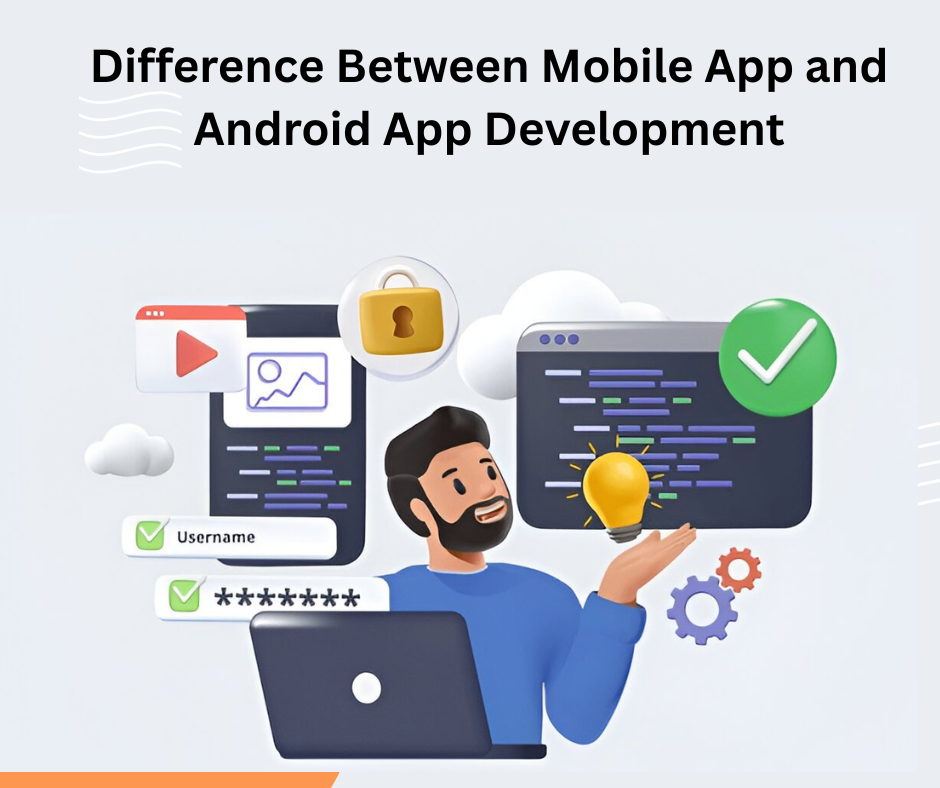
Apps nowadays have been a constant player in shaping how we interact with technology. From ordering food and booking cabs to managing finances and staying connected, an app is a digital gateway to convenience, efficiency, and personalization. But before moving any further, it is important to understand the distinction between mobile app development and android app development, as each serves different purposes in the tech ecosystem.
Understanding the difference can help businesses make better decisions when hiring developers or choosing an app development company. So, this guide will glance at the core differences between both and help you identify which approach aligns best with your business goals.
What is Mobile App Development?
Mobile app development is the process of creating software applications that run on mobile devices such as smartphones and tablets. It involves designing, building, testing, and deploying apps that deliver specific functionalities to users on platforms like iOS (Apple), Android (Google), and cross-platform solutions (Flutter, React Native, etc.).
Key highlights of mobile app development:
Covers multiple platforms (iOS, Android, cross-platform).
Uses different programming languages like Swift, Kotlin, JavaScript, or Dart.
Focuses on reaching a wider audience across devices.
More complex and often requires a bigger budget.
What is Android App Development?
Android app development is the process of creating software applications specifically designed to run on devices powered by the Android operating system. This includes smartphones, tablets, smartwatches, TVs, and even in-car systems. Android holds over 70% of the global mobile OS market share, making it a strategic choice for businesses targeting mass audiences.
Key highlights of Android app development:
Targets Android smartphones, tablets, and wearables.
Primarily uses Java and Kotlin programming languages.
Built with tools like Android Studio and Google’s SDK.
Usually more cost-effective than building for multiple platforms.
Key Differences Between Mobile App Development and Android App Development
What makes mobile app development and Android app development distinct lies in their scope, platform focus, and development approach.
Feature | Mobile App Development | Android App Development |
Scope | Covers iOS, Android, and cross-platform | Focuses only on Android OS |
Programming Languages | Swift, Objective-C, Kotlin, Java, Dart, JavaScript | Java, Kotlin |
Tools | Xcode, Android Studio, Flutter, React Native | Android Studio, Android SDK |
Target Audience | Both Android & iOS users | Android device users only |
Cost & Time | Higher (multi-platform) | Lower (single platform) |
When to Choose Mobile App Development vs. Android App Development
Go for mobile app development if you want your app to work on both iPhones and Android phones. It’s a smart choice for businesses that want to reach more people and grow faster around the world.
Choose Android App Development if your target audience mainly uses Android devices or if you want to take full advantage of Android-specific features like customer widgets, background services, or integration with Google’s ecosystem.
Future Trends in Mobile and Android App Development
With time, both mobile app development and Android app development are growing rapidly, driven by technological innovation, changing user behavior, and the increasing demand for smarter, faster, and more personalized digital experiences. Some of the key trends you might see include:
AI and Machine Learning- Smart features like chatbots and personalized suggestions are making apps more helpful and interactive. These tools help apps learn what users like and respond better.
Cross-Platform Development Tools- Tools like Flutter and React Native let developers build one app that works on both Android and iPhones, saving time and effort.
5G Technology- With super-fast internet from 5G, apps can now offer cool features like virtual reality, live video chats, and instant updates without lag.
Wearable and IoT Integration- Apps are now connecting with smart devices like watches, fitness bands, and home gadgets. Android is already ahead in making these connections work smoothly.
Super Apps- Popular in Asia, super apps combine many services like chatting, shopping, and paying bills, into one app. This idea is shaping how future apps will be built.
Final Thoughts
While mobile app development is a great choice for businesses aiming to reach users across both Android and iOS platforms, Android app development offers a more focused approach for those targeting the Android ecosystem specifically. Each path has its own strengths, mobile apps provide wider reach and flexibility, whereas Android app development allows for deeper customization and faster deployment within the Android environment.
So, whatever choice you make depends on your audience, goals, and resources. Whether you're building a universal app or focusing on a single platform, aligning your strategy with user needs is key to long-term success.













